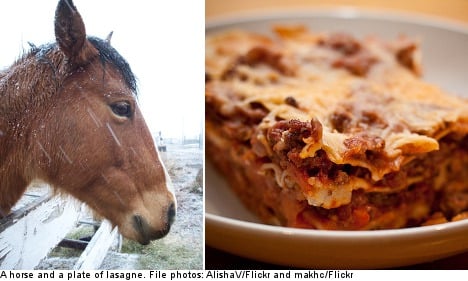The company behind the retailers’ withdrawn products used meat from the slaughterhouse that supplied meat for Findus’ recalled single-portion beef lasagne.
Axfood, Coop and Ica are therefore concerned that some of the products sold in their supermarkets, which are labelled as beef lasagnes, may actually contain horsemeat.
The products are Eldorado Lasagne Bolognese 1 kilo, Willys Lasagne Bolognese 400 gram, Hemköp Lasagne Bolognese 400 gram, Coop lasagne 400 gram, and Ica Basic 400 gram.
“We suspect that the mince could contain horsemeat, but it has not been confirmed yet by the supplier,” Johanna Stiernstedt, quality manager at Ica, told the TT news agency.
Like Findus, Axfood sent samples of meat for analysis, but the lab has not yet confirmed the company’s suspicions.
All affected food companies have insisted that there is no health risk involved in eating the horsemeat.
Findus had to recall beef lasagne ready meals in the UK too after tests there showed that they contained up to 99 percent horsemeat, reported the Guardian newspaper.
In France, Findus withdrew moussaka and cottage pie meals from the supermarkets.
Findus’ ready meals are produced in Luxembourg by the French manufacturer Comigel.
Erich Lehagre, the director of Comigel, told AFP that the horsemeat came from a Rumanian slaughterhouse and was delivered to Comigel via the French meat handling company Spanghero.
Comigel delivers frozen meals to 16 countries, including Scandinavia.
The British Food Standards Agency (FSA) said the Findus lasagne is probably not dangerous but ordered tests to determine whether it contains the common horse painkiller phenylbutazone, often known as bute, which is banned from entering the food chain.
Henrik Nyberg, head of production at Findus in Sweden, said the company has not yet decided what actions to take against Comigel.
“We have put a lot of pressure on this supplier,” Nyberg said.
“What is already clear is that Comigel’s subcontractor will never again deliver meat to Findus. We demand certificates and verifications from our suppliers and we carry out regular quality controls. It was at one of these controls that the supplier noticed the error,” Nyberg explained.
All other beef suppliers have assured Findus that there is no horsemeat in their products.
Swedish customers with the product at home have been advised to return it, or to contact Findus online or by telephone.
TT/The Local/nr Follow The Local on Twitter



 Please whitelist us to continue reading.
Please whitelist us to continue reading.
Member comments